CAIRO – Egypt’s President Abdel Fattah El Sisi on Saturday called for finalizing all phases of “Egypt’s Future” project for agricultural production as soon as possible.
During his inauguration of the agricultural production project on Cairo-Dabaa road, President Sisi said the State’s measures require deep understanding and many studies that would help determine the feasibility and future plans of the project.
Cost of cultivation in “Egypt’s Future” project is much higher than anywhere in the Nile Delta, Sisi added.
Meanwhile, director of “Egypt’s future” project for agricultural production Bahaa el Ghannam said strenuous and painstaking efforts were exerted to fulfill the project, which is making new additions to the achievements made by the state every day.
The mega agricultural project is mainly contributing to producing all crops needed in the country, added Ghannam in remarks during the inauguration ceremony.
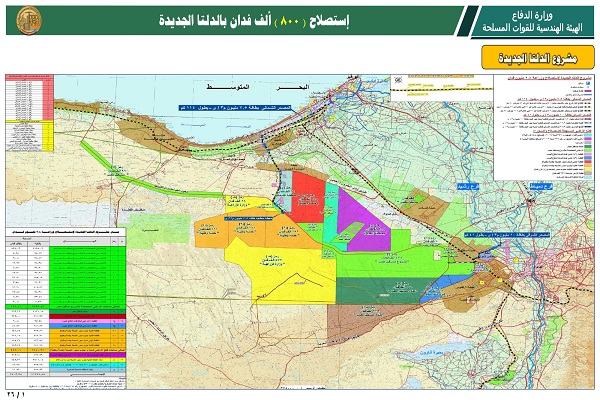
The inauguration of the project is a step toward the fulfillment of the “New Delta” project, which is expected to realize an unprecedented quantum leap not only in agriculture and industry, but also in numerous other fields nationwide, he pointed out.
President Abdel Fattah El Sisi, who inaugurated the project, was briefed on the development phases, plans and goals of the project.
The 1,050,000 feddan project represents 50% of the “New Delta” project, he noted.
The president ordered completing phases of “Egypt’s Future” project for agricultural production before the end of 2023.
Commenting on a presentation given by Director of “Egypt’s Future” project Bahaa el Din el Ghannam, Sisi affirmed the importance of expediting the completion of the project’s third phase before the end of 2023, instead of the original date in 2024, due to the conditions surrounding the country as a result of the global economic crisis.
It is important to complete this project before 2023 in parallel with the projects already being implemented in Toshka, Beni Suef and Minya due to the current difficult circumstances, the president added.
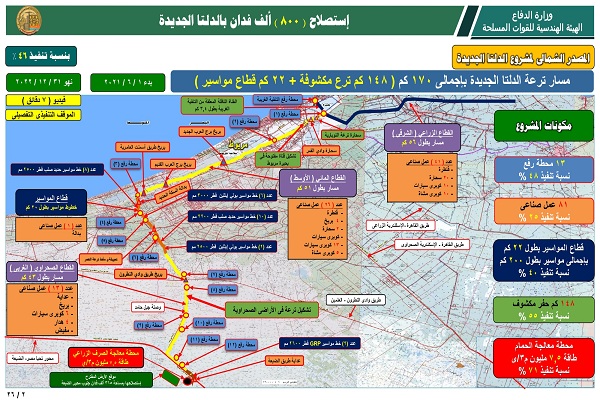
Speaking during the inauguration ceremony of “Egypt’s Future” agricultural project, President Sisi said the costs of such projects in the desert are much higher than anywhere in the old Nile Delta because reclamation here is taking place deep in the desert, in a way that differs from cultivation in the areas located along the banks of the River Nile.
Sisi said that the country is now paying dearly for all the years of neglect that allowed for encroachments to increase on its precious agricultural lands along the banks of the Nile and in the old Nile Delta. These disastrous violations have diminished the nation’s wealth of rich arable lands, he added, noting that just three years ago the estimated cost of reclaiming one million feddans was EGP 200-250 billion, expecting the cost to be much higher now given the current global economic crisis.
Director of “Egypt’s Future” for agricultural production Bahaa el Ghanam said the State set up several major traffic axes and roads such as Rod el Farag axis and Dabaa axis.
The establishment and renovation of the country’s road networks have made the transport of crops and commodities relatively easier, cheaper and much faster, according to him.
“That is a big economic addition to the value of the project,” he added.
Ghanam pointed out that the project calls for digitalizing and assessing data to review employees’ performance.
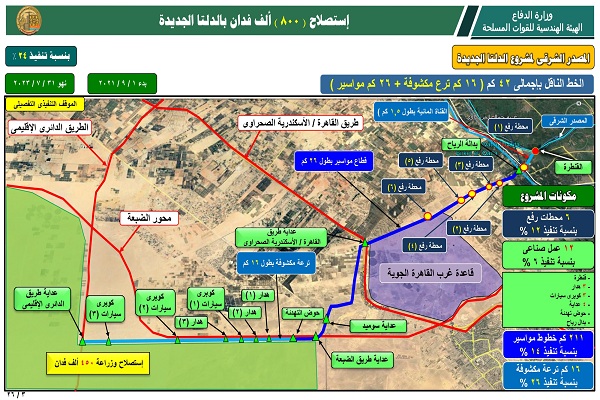
A crisis-management department will be built to handle any crises the country may face, such as the Russian-Ukrainian conflict for instance, he noted.
The project’s administration is in contact with the scientific research centers and agriculture faculties at universities to reach the best results on a good scientific basis in order to create a new generation that is well aware of the need of making further agricultural expansions by using more advanced methods, according to him.
President Sisi said the target of his speech during inaugurations or follow-up of projects is clarifying matters, highlighting the infrastructure projects.
He noted that the ‘Egypt’s Future’ agricultural project needs 1,250 megawatt electricity units.
He said the state’s interest in developing the infrastructure over the past seven or eight years has secured needed electricity for this important project.
The project aims at adding 2.5 million feddans, representing 25 percent of the currently cultivated lands in Egypt, he said.
Moreover, needed electricity was secured to houses and hospitals that were suffering from repeated power outage, he added.
As for calls for re-setting priorities, he said “We are not talking about luxury, but about important factors. We cannot speak about an important project like ‘Egypt’s Future’ agricultural project and Toshka project, while neglecting electricity and road projects.”
He referred to upgrading the efficiency of the Dabaa road, calling for verifying the authenticity of information circulated about mega projects.
He also cited ongoing efforts to develop water and electricity networks in the countryside under “Decent Life” project whose estimated cost stood 800-900 billion pounds and can hit one trillion in view of current rising prices.
He said “What was achieved in Egypt over the past 400-500 years in cultivating the Delta, we want to achieve it in the desert within four or five years. Therefore, what is being achieved is indeed a great thing.”
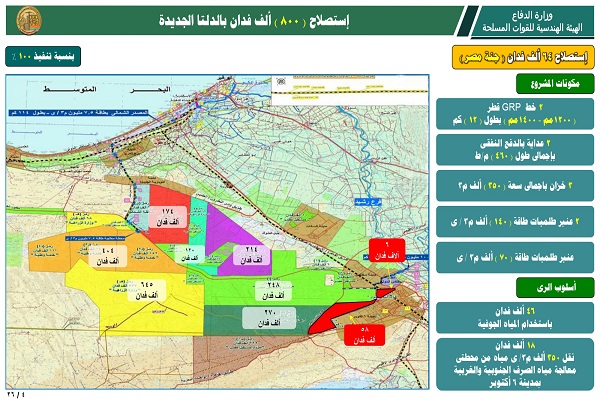
As for calls for focusing on education instead of spending all this money on infrastructure projects, Sisi said education is a top priority, but the state could not allocate all its resources to education. “People would never bear having shabby infrastructure and lack of services.”
He said what is being achieved in the state is the outcome of work of specialized committees of experts that lay down comprehensive visions and achieve set goals.
President Sisi said the projects being implemented were reviewed by a committee of university professors and statesmen.
He stressed that he is keen to always listen to the ideas of others to be well informed about all aspects of any file he handles, adding that it is impossible to go forward and achieve progress in any project without standing on a solid basis.
He added that data about all the country’s projects, policies and programs is available in details on the government and presidency websites.
President Sisi said that all of these projects have been implemented despite the fact that the State is targeted by terrorism and extremism.
Responding to calls for cultivating a million feddans of wheat, the president noted that work is under way in coordination with the Ministry of Agriculture and Land Reclamation to cultivate new disease- and pest-free land with an aim to produce good seeds, asserting the State’s keenness to produce other products alongside wheat.
Meanwhile, Minister of Agriculture El Sayed el Quseir said implementing mega projects takes a while for completing studies and planning to assess all factors including, for example, the type of soil, crop structure and economic revenues.
He added that the State is moving towards supporting the cultivation of strategic crops, pointing out to the great importance of enhancing and diversifying the country’s agricultural produce to realize food security.
The ministry, supported by the president and with the help of research centers, tends in the coming period to expand the production of good quality and high-yield seeds, Quseir said.
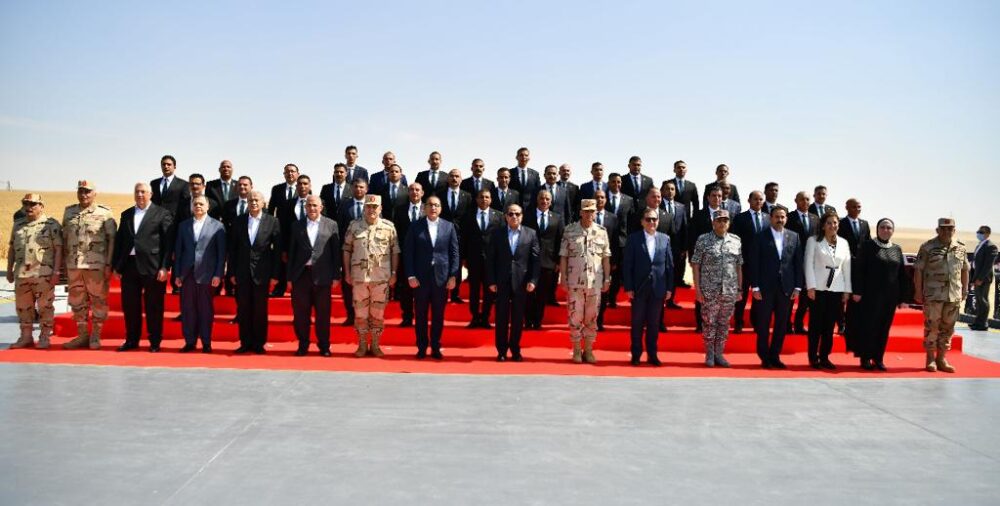
The State is currently able to meet more than 50 percent of demand for the seeds which achieve high productivity, the president said during the inauguration of “Egypt’s Future” agricultural project.
Meanwhile, the agriculture minister said more than 60 percent of demand for high-yield seeds were met last year.
Speaking about wheat crops, the minister said the percentage of meeting seed needs was lower than that of demand.
In this regard, he noted that after Sisi’s directives for boosting the production of high-quality seeds, his ministry decided to benefit from Egypt’s Future project, among others, to cultivate more of them to supply farmers with all their needs.
The president pointed out that the irrigation and cultivation of land in the Nile Delta do not need water-lifting stations or canals while the land being cultivated as part of this project required lifting stations, therefore two stations for lifting water to more than 80 meters were set up to be merged with a 40-kilometer-long canal.
Such a move requires a very high cost to cultivate 60,000 feddans and place them on the production map, Sisi said.
The president added that there is a gap between the increasing population growth and the current economic growth rates, noting that the State is working to bridge this gap.



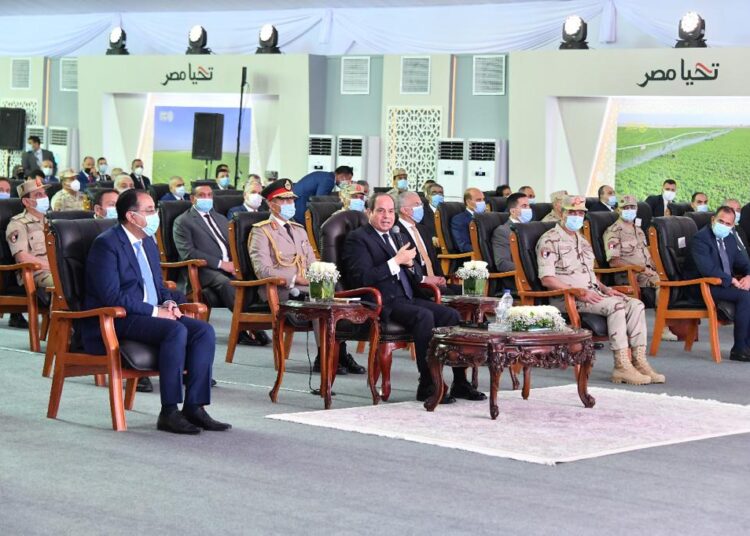


Discussion about this post